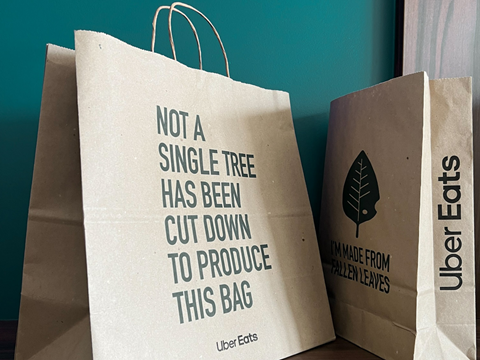
Releaf Paper has announced its participation in Uber’s Paris Innovation Pilot, aiming to help local restaurants reduce waste and carbon emissions through its paper bags made from fallen leaves.
Part of Uber’s global sustainability initiative, the reported investment of nearly $1 million in the Paris Innovation Pilot seeks to help local restaurants transition to sustainable packaging through solutions such as Releaf’s paper bags. Releaf’s products will be available via Uber Eats’ Green Packaging Marketplace.
Releaf says its paper products - which will soon be produced locally in France - provide a ‘sustainable alternative’ to plastic and traditional packaging. By integrating its products into Uber’s global supply chain, the company hopes to help scale solutions that reduce waste and protect the environment.
“We’re thrilled to be a part of Uber’s ambitious journey towards a zero-emissions future, starting in Paris,” said Alexander Sobolenko, general manager of Releaf Paper. “By using fibres from fallen leaves, collected by public utilities in urban areas, we transform waste into eco-friendly materials that are both beautiful and functional. This innovative approach reduces deforestation and carbon emissions, contributing to a more sustainable future.”
In similar news, last year Dobis converted Mondi’s range of paper grades containing recycled fibres into paper bags for fashion, fast food, and retail products, claiming to lightweight the packaging and reduce material consumption while maintaining strength and print quality. Dobis states it has transitioned into lighter-weight papers without impacting the necessary strength and print quality for premium shopping bags.
More recently, Lieferando began providing partnering restaurants with corrugated paper delivery boxes from Huhtamaki, coated with Xampla’s plant-based polymer, in hopes of providing ‘plastic-free’ and ‘biodegradable’ packaging solutions for a broader range of dishes. Said to be compliant with the Single-Use Plastics Directive, the boxes are thought to be suitable for transporting various food types including fatty foods, due to their thermal insulation and ‘high’ stability.
If you liked this story, you might also enjoy:
The ultimate guide to the Packaging and Packaging Waste Regulation in 2025
How are the top brands progressing on packaging sustainability?
Everything you need to know about global packaging sustainability regulation in 2025
The key to increasing the use of reusable packaging in supermarkets














No comments yet